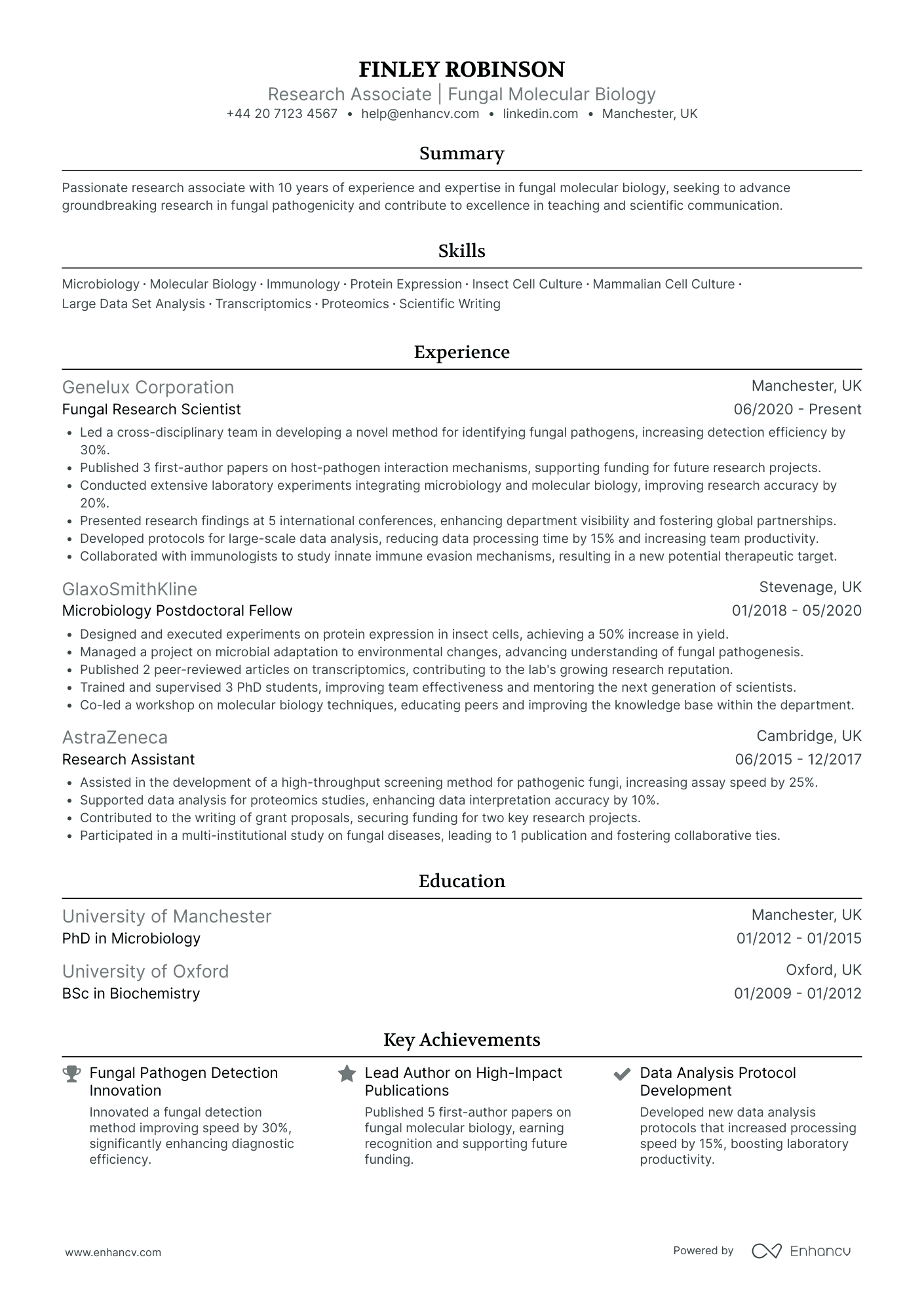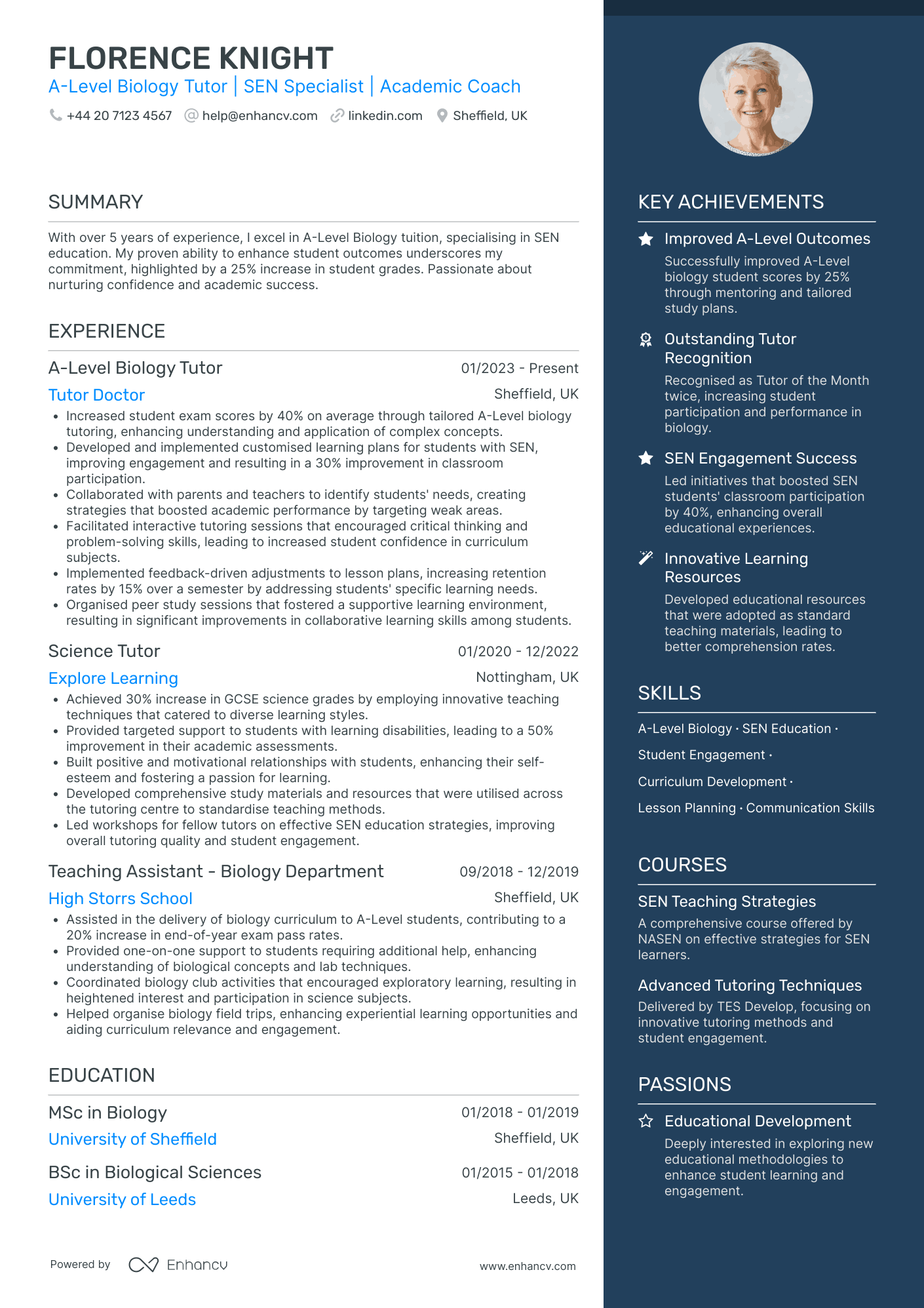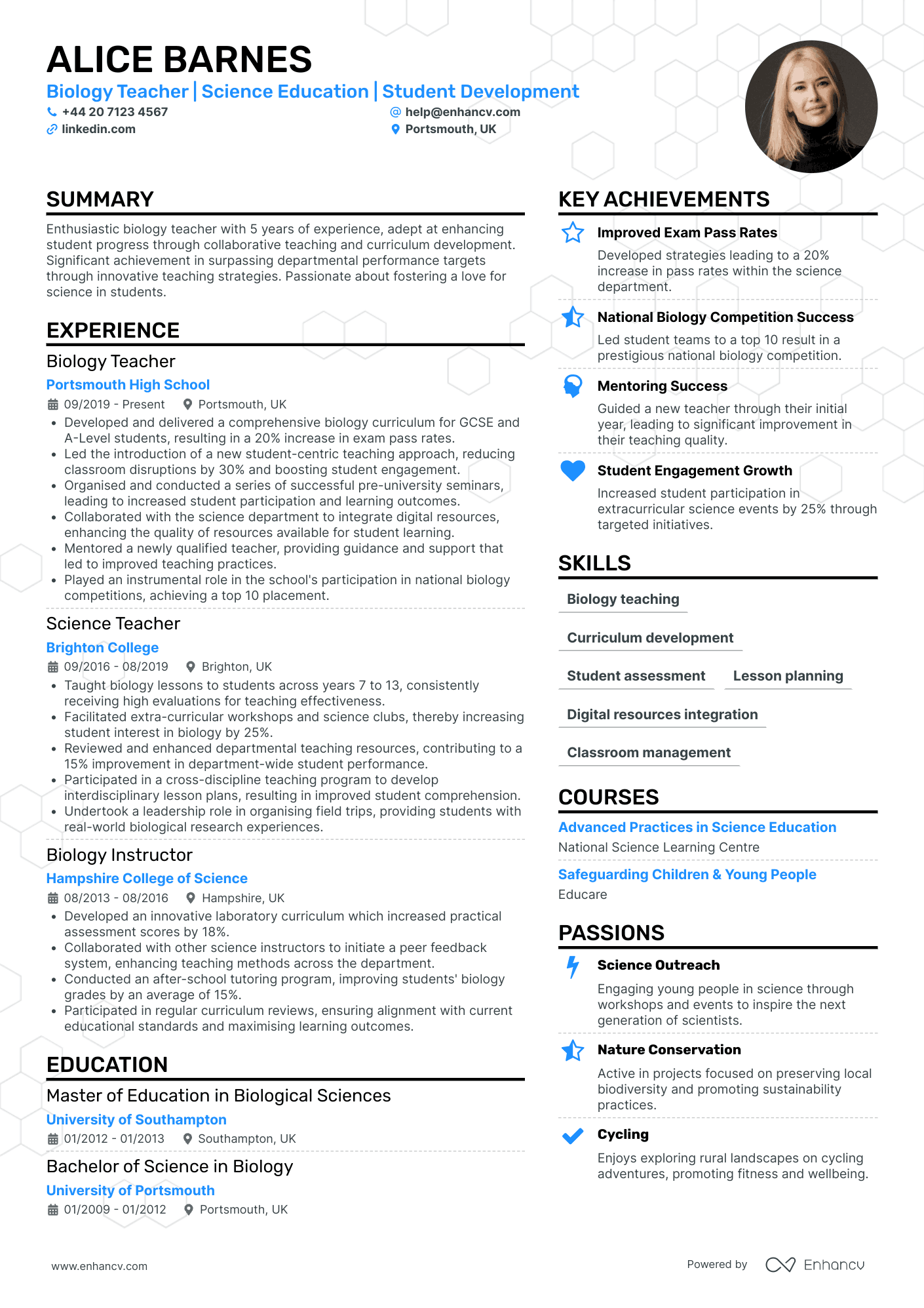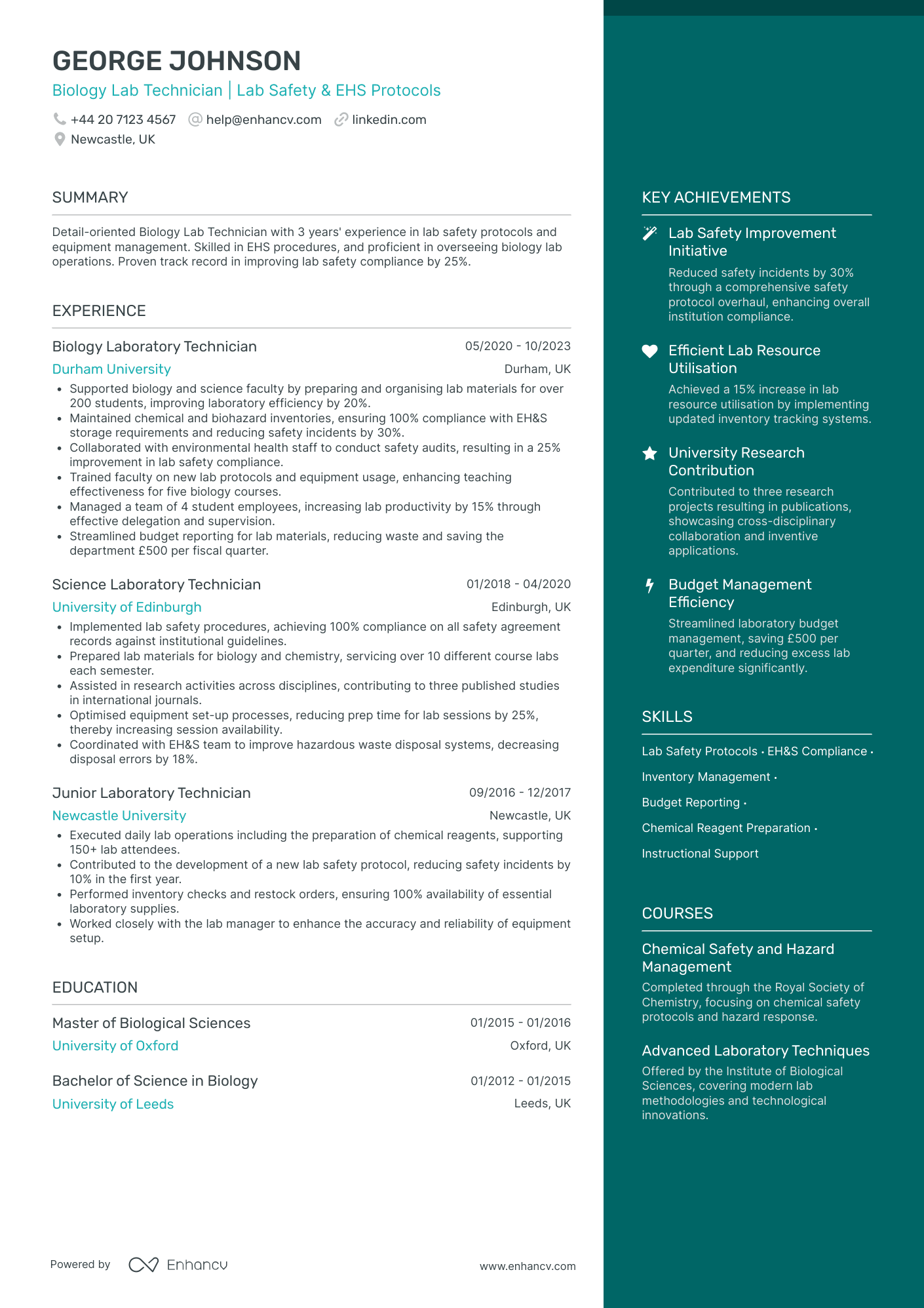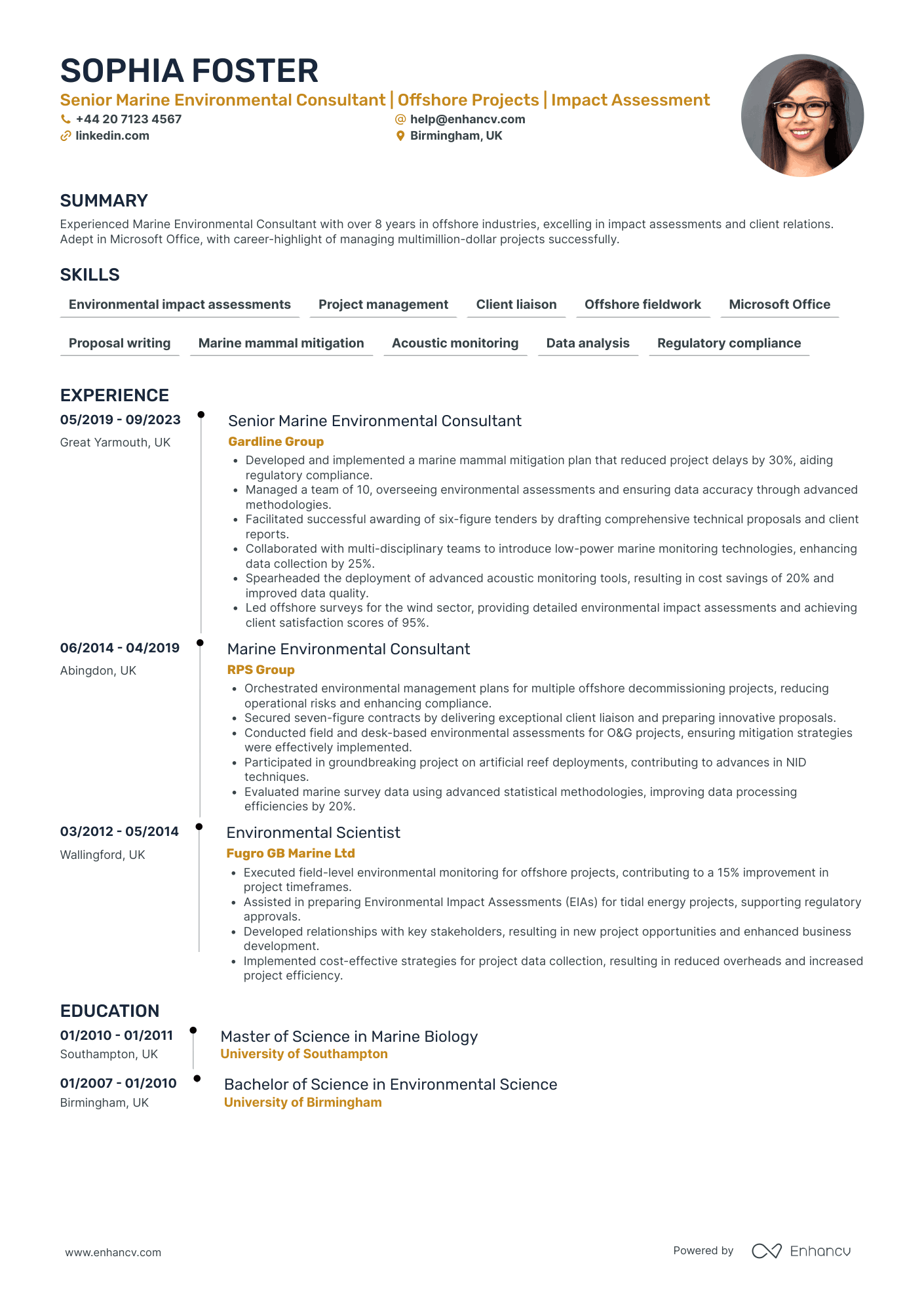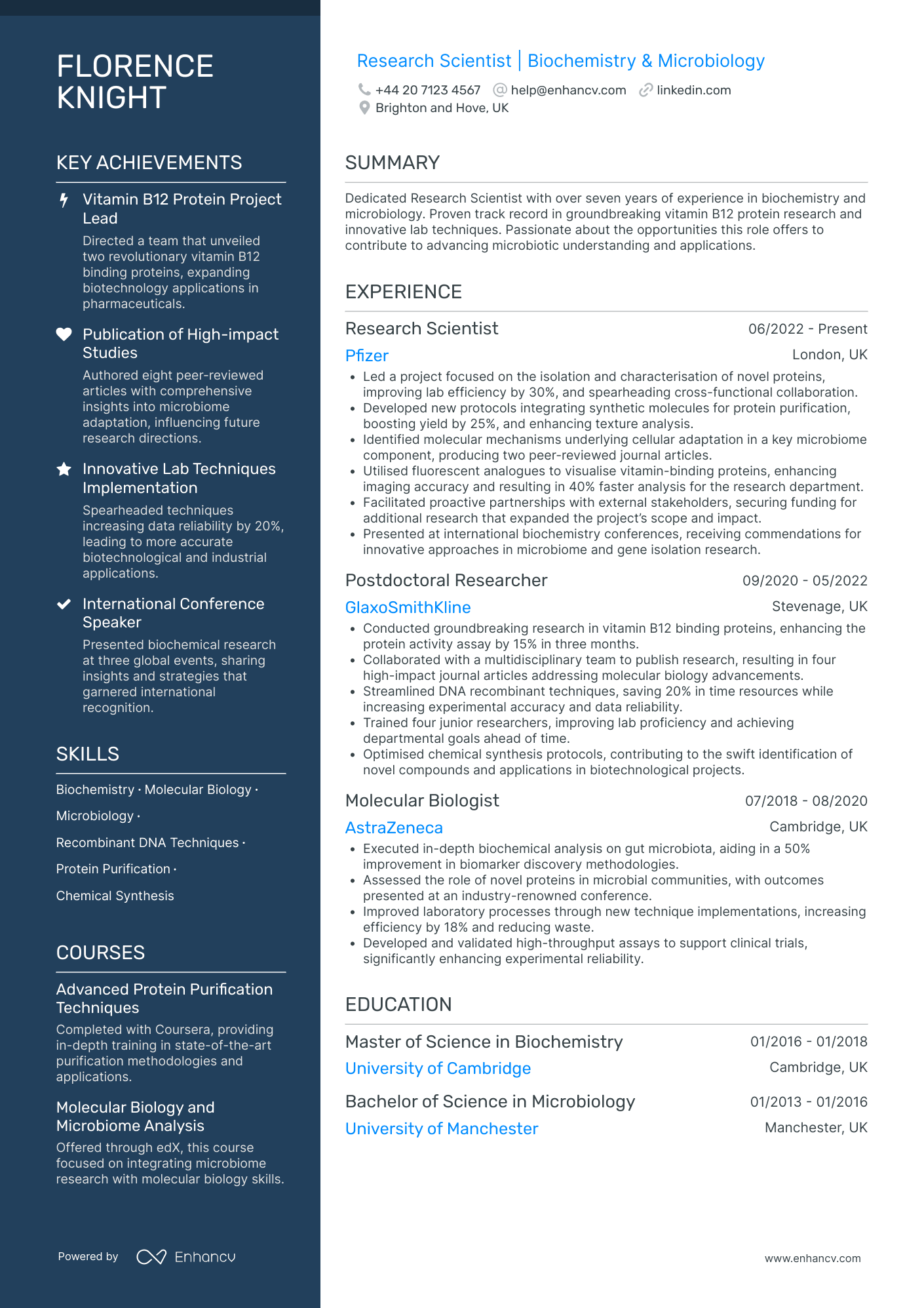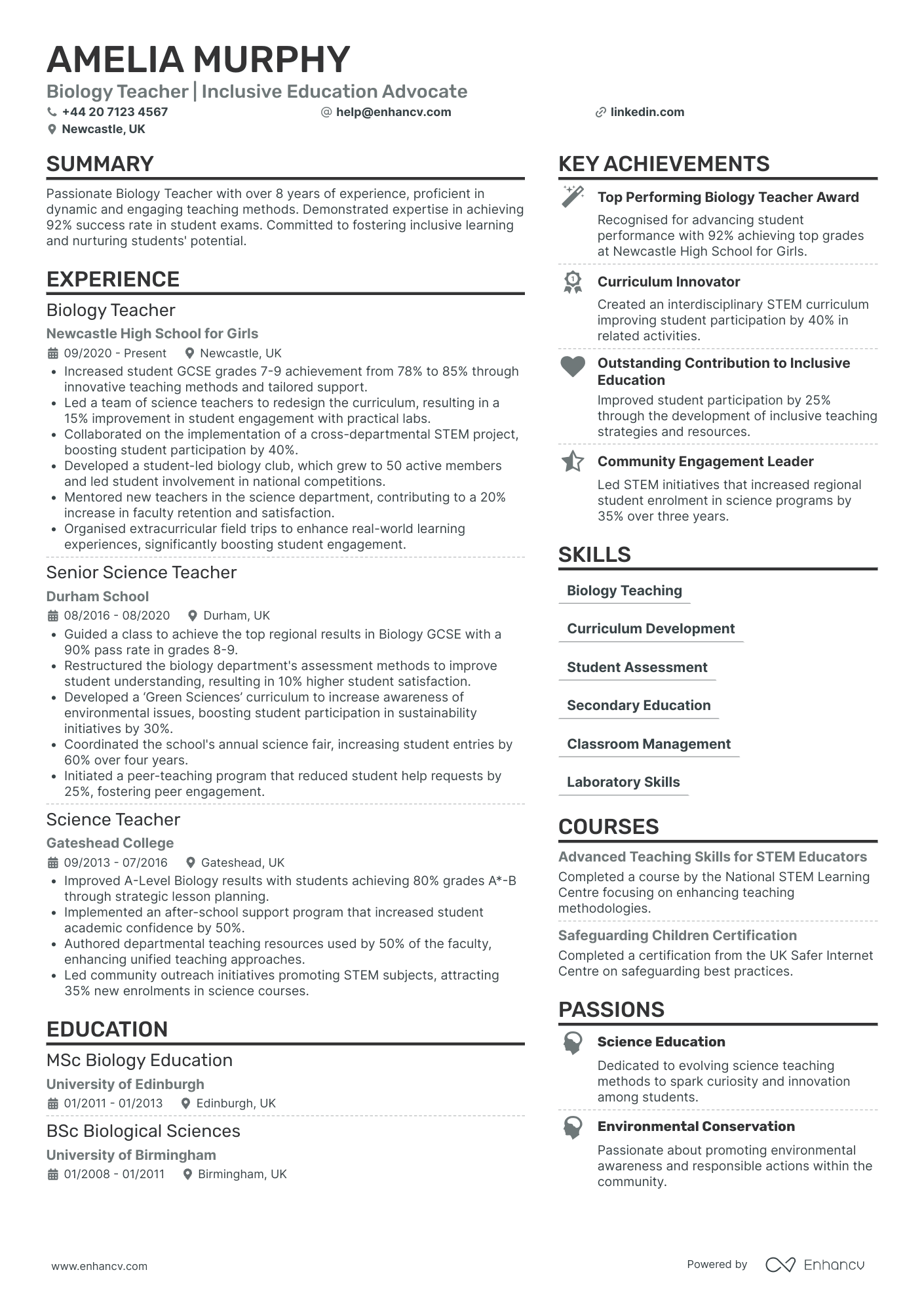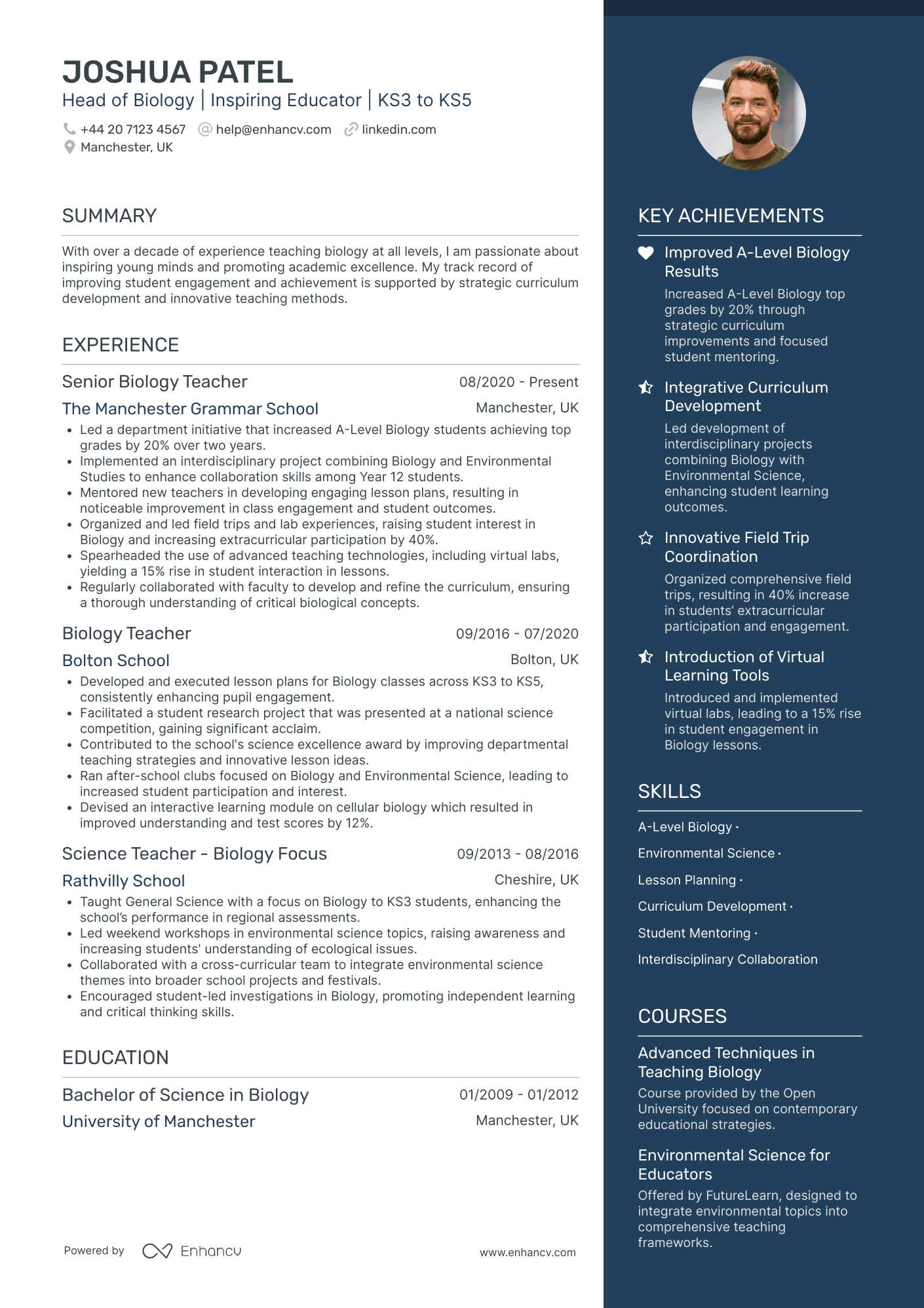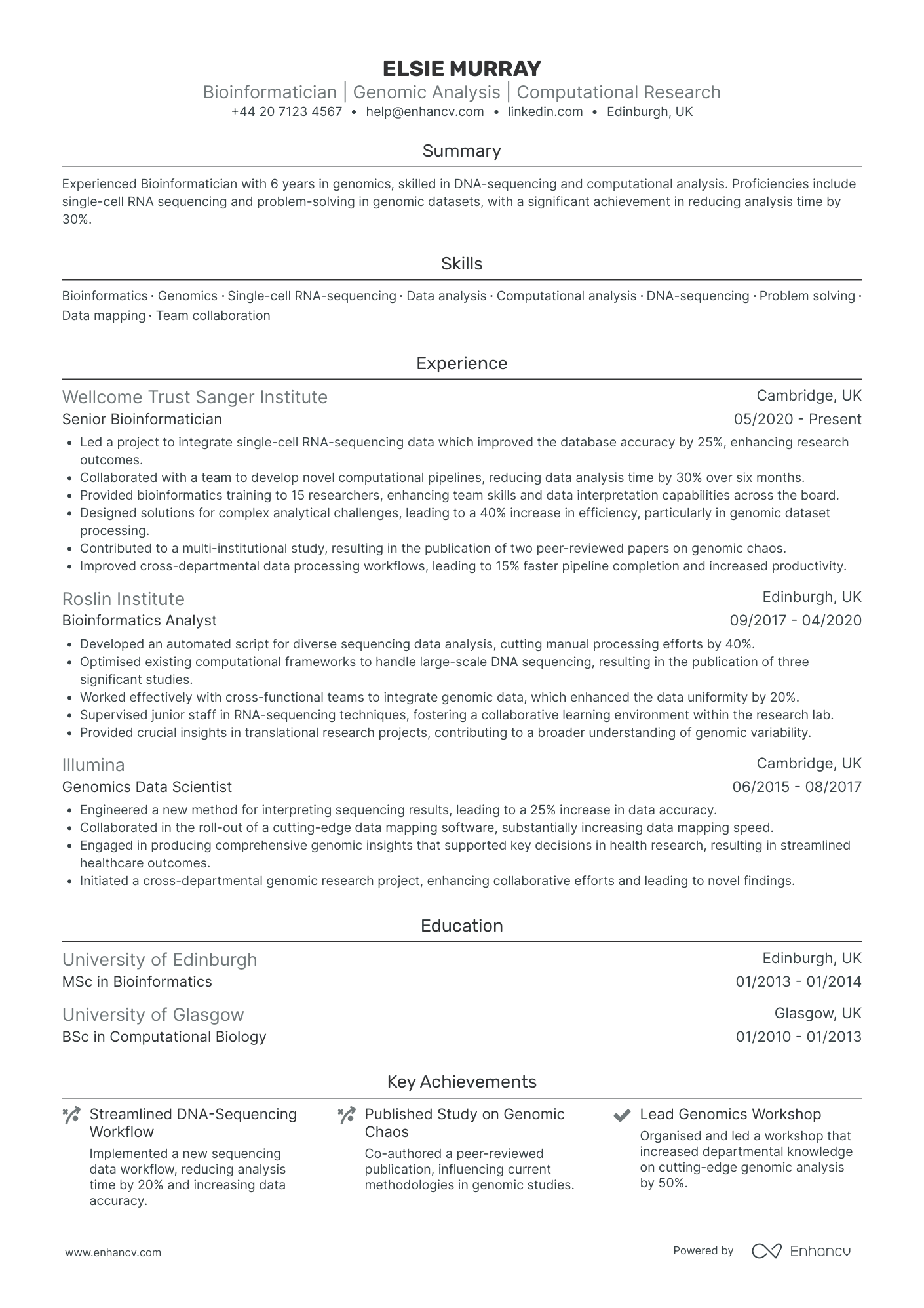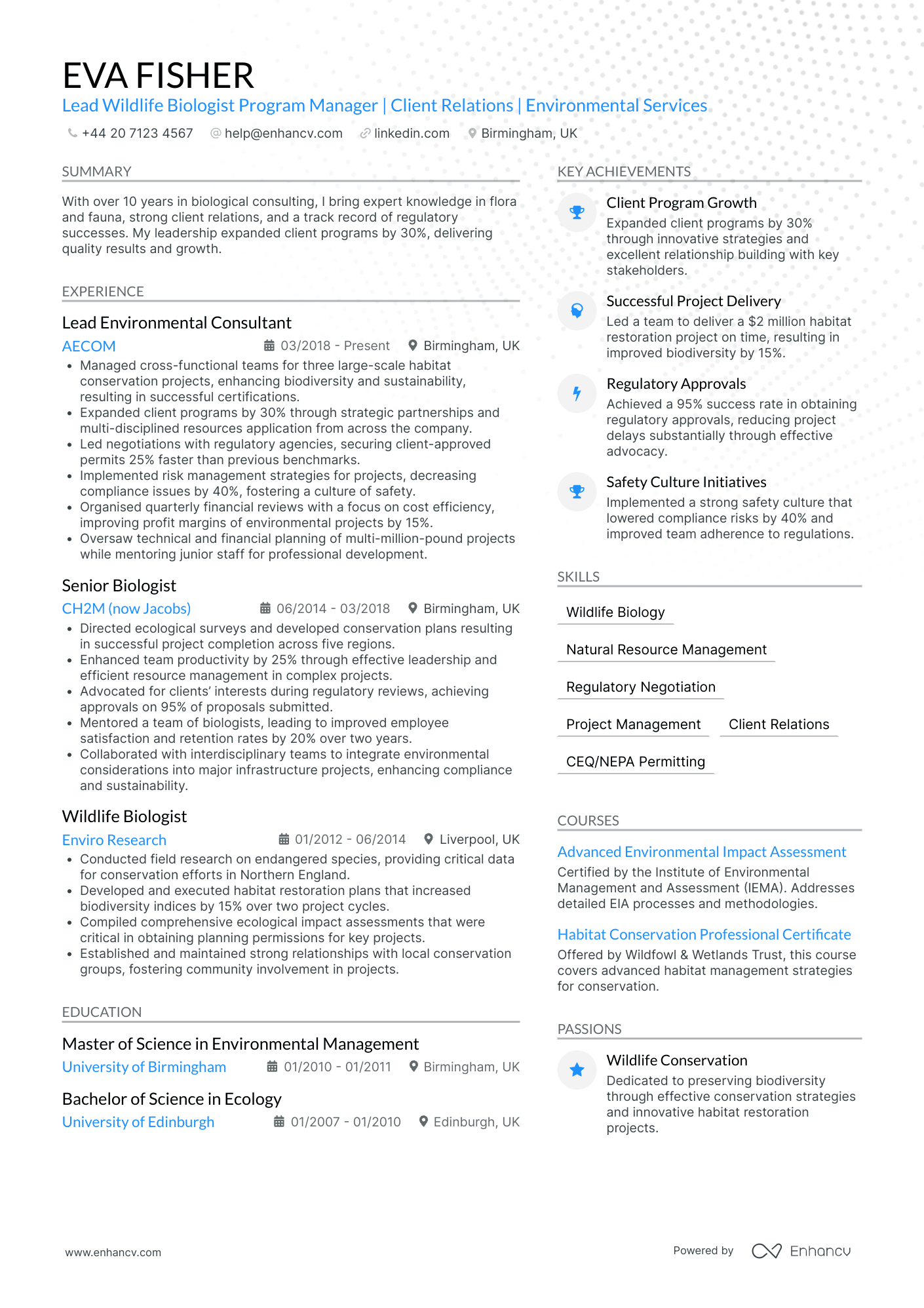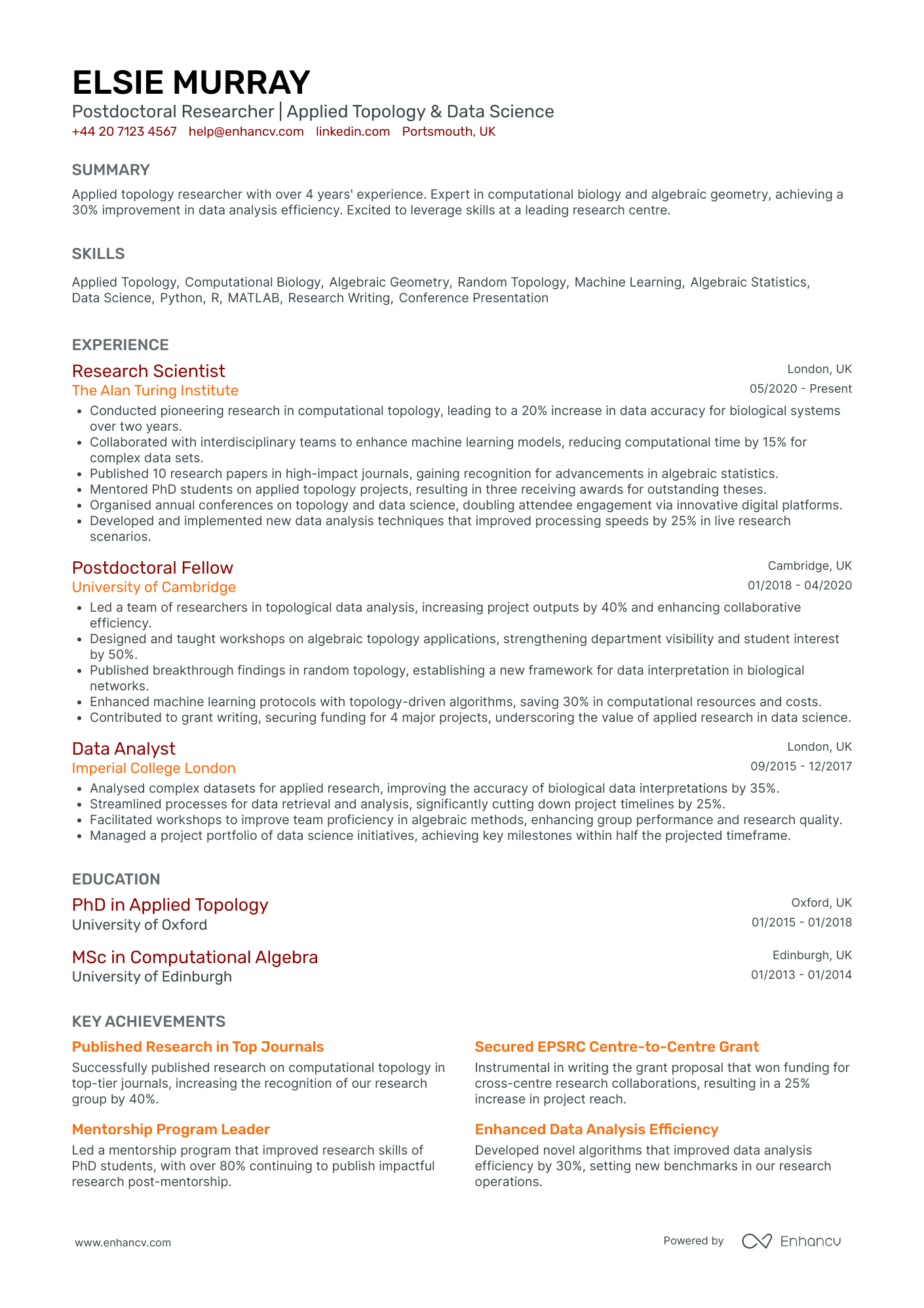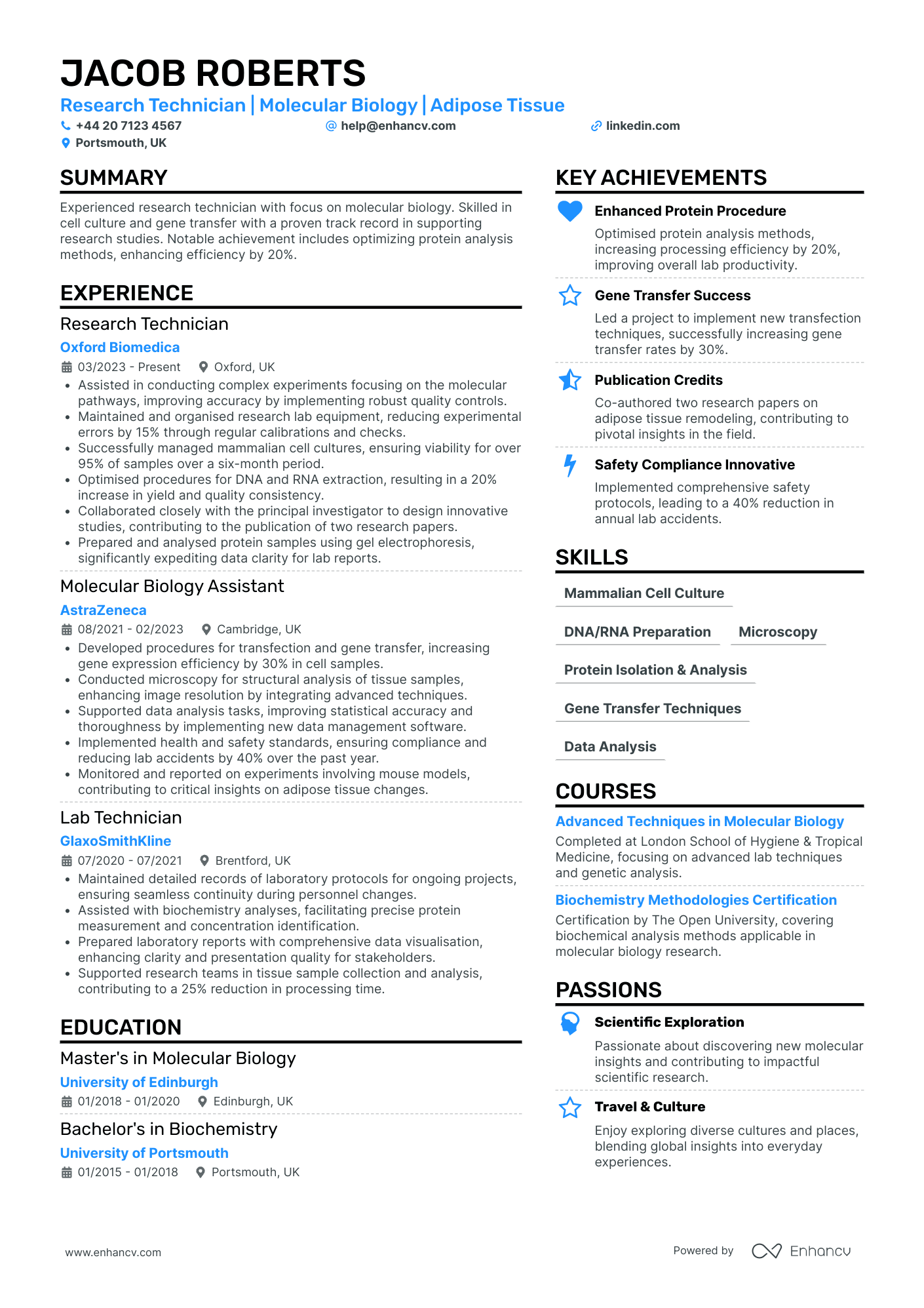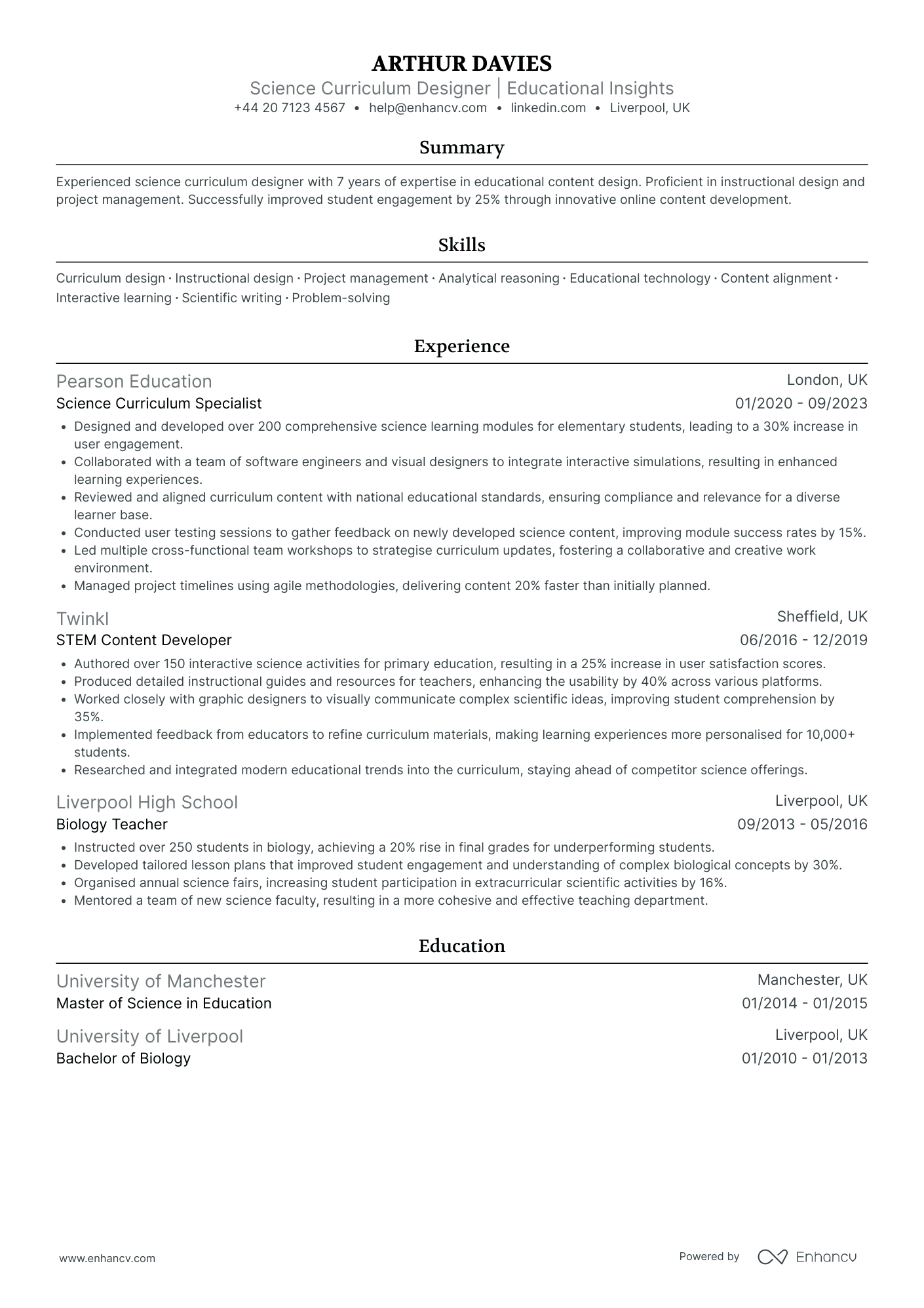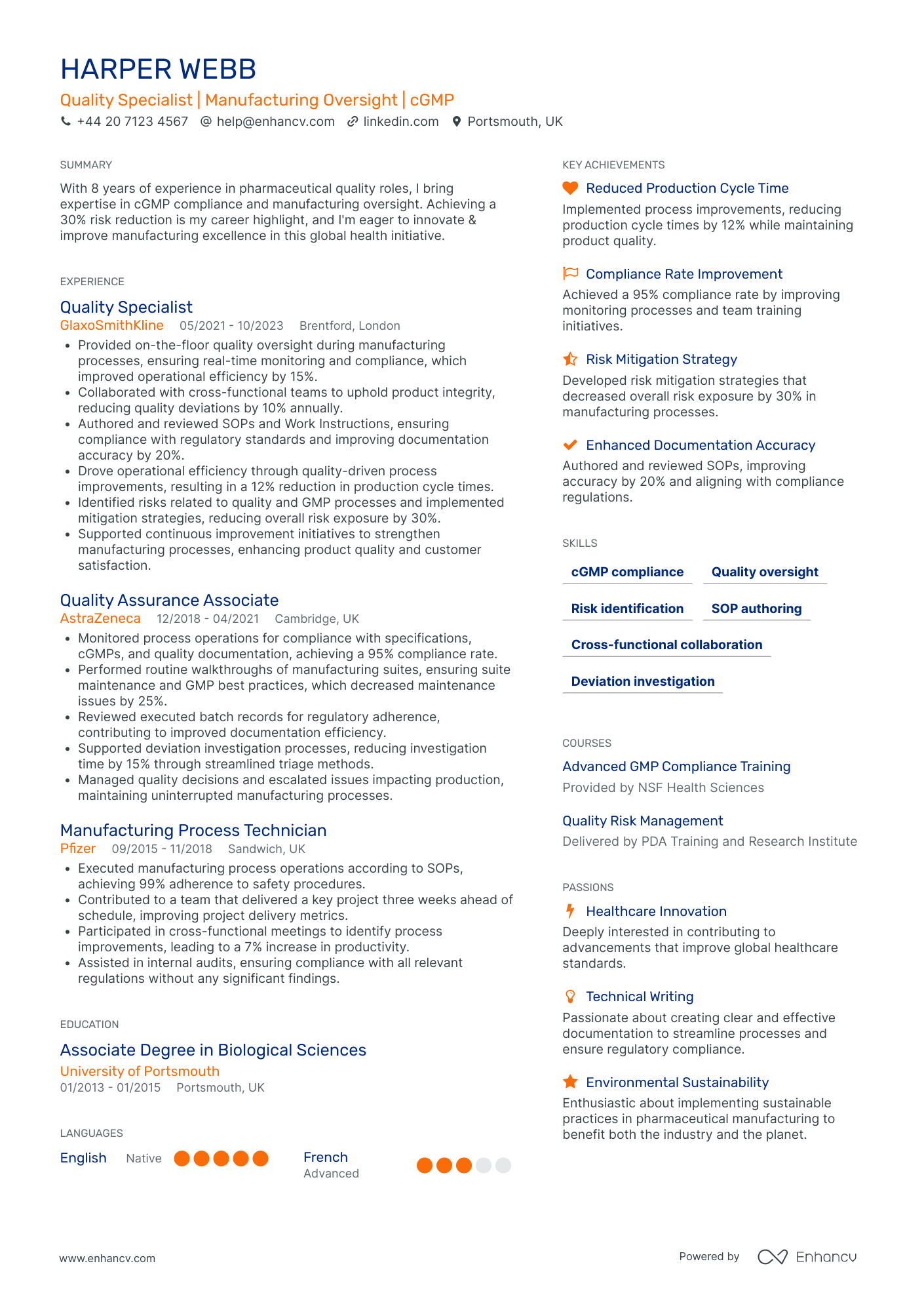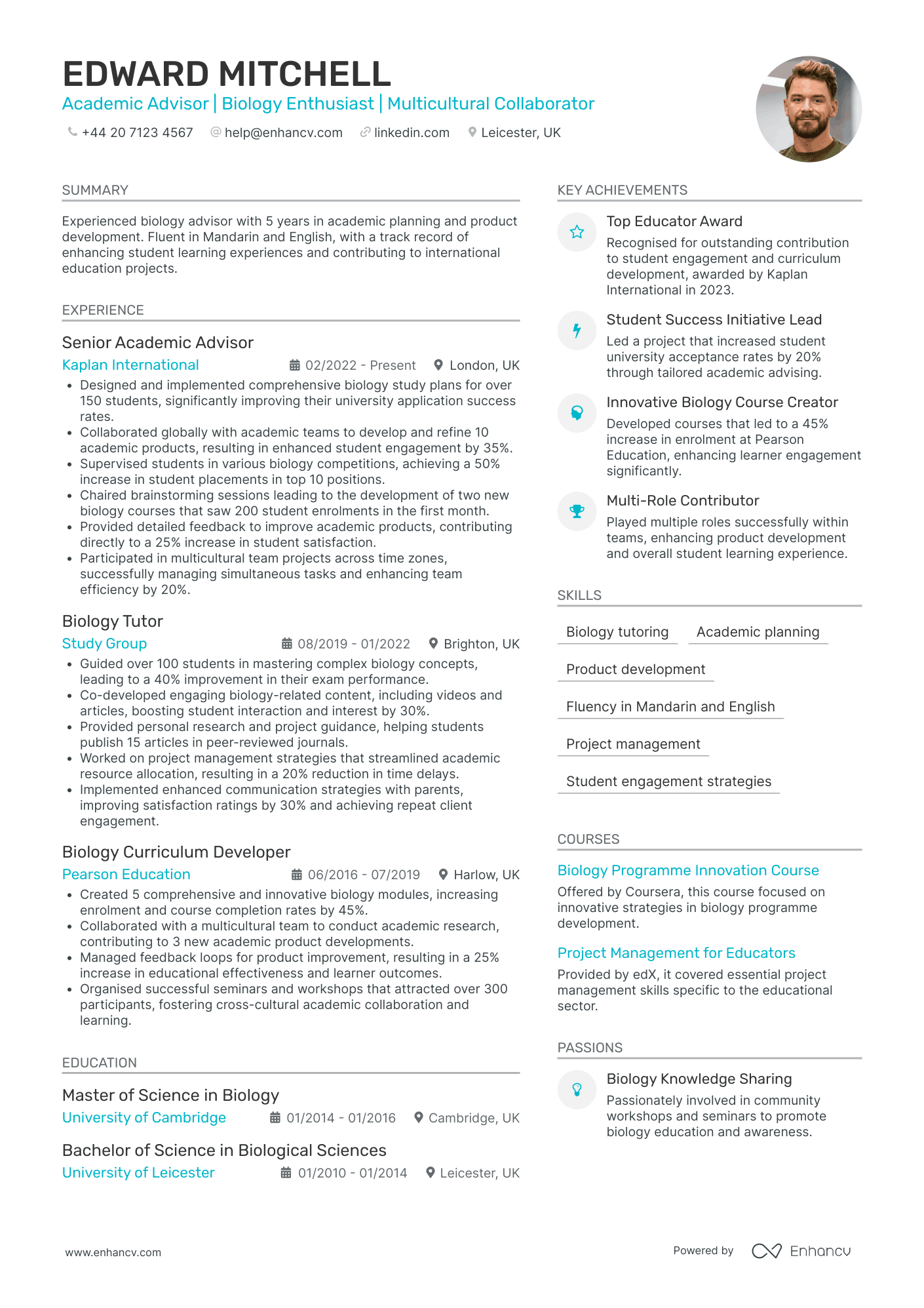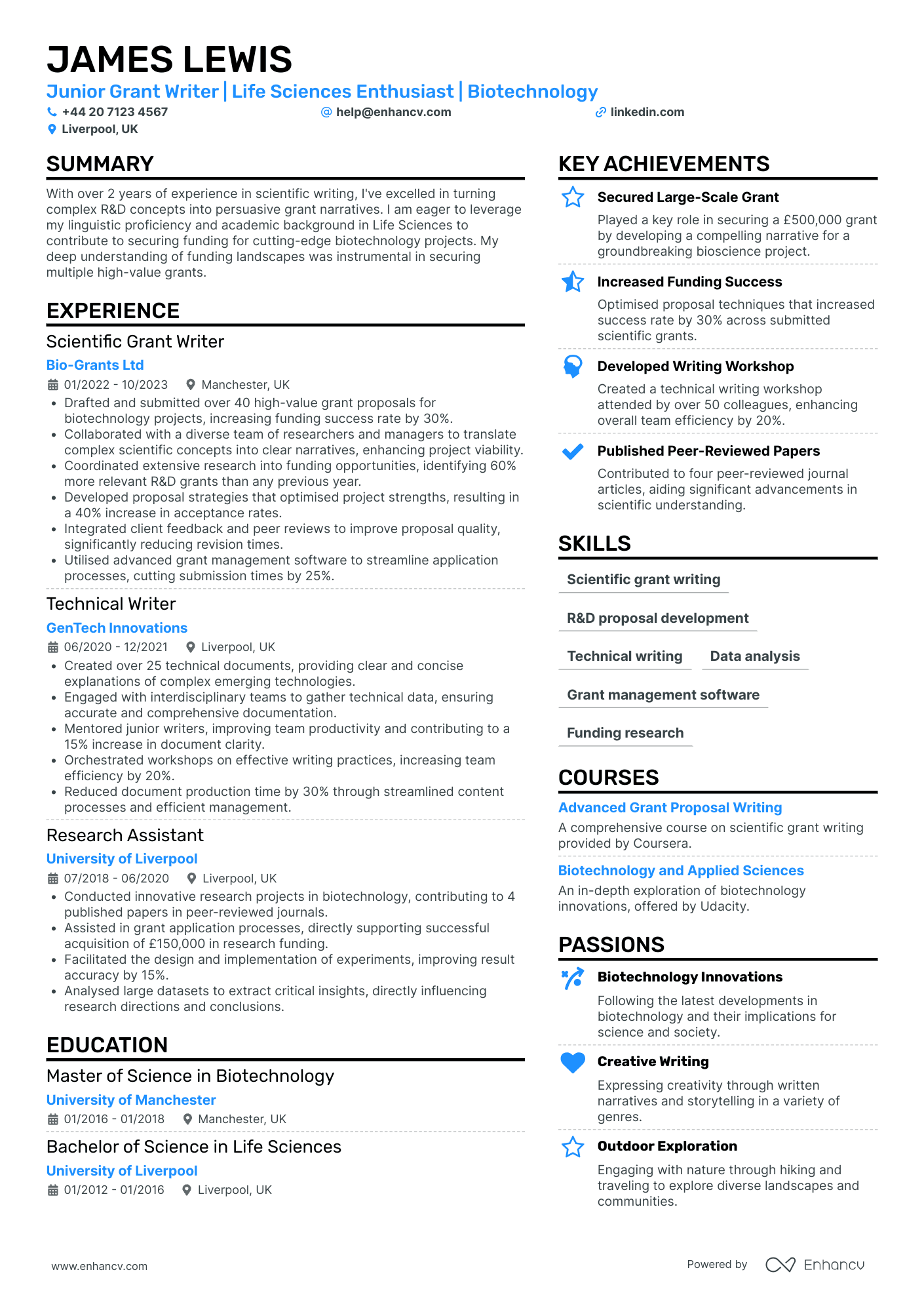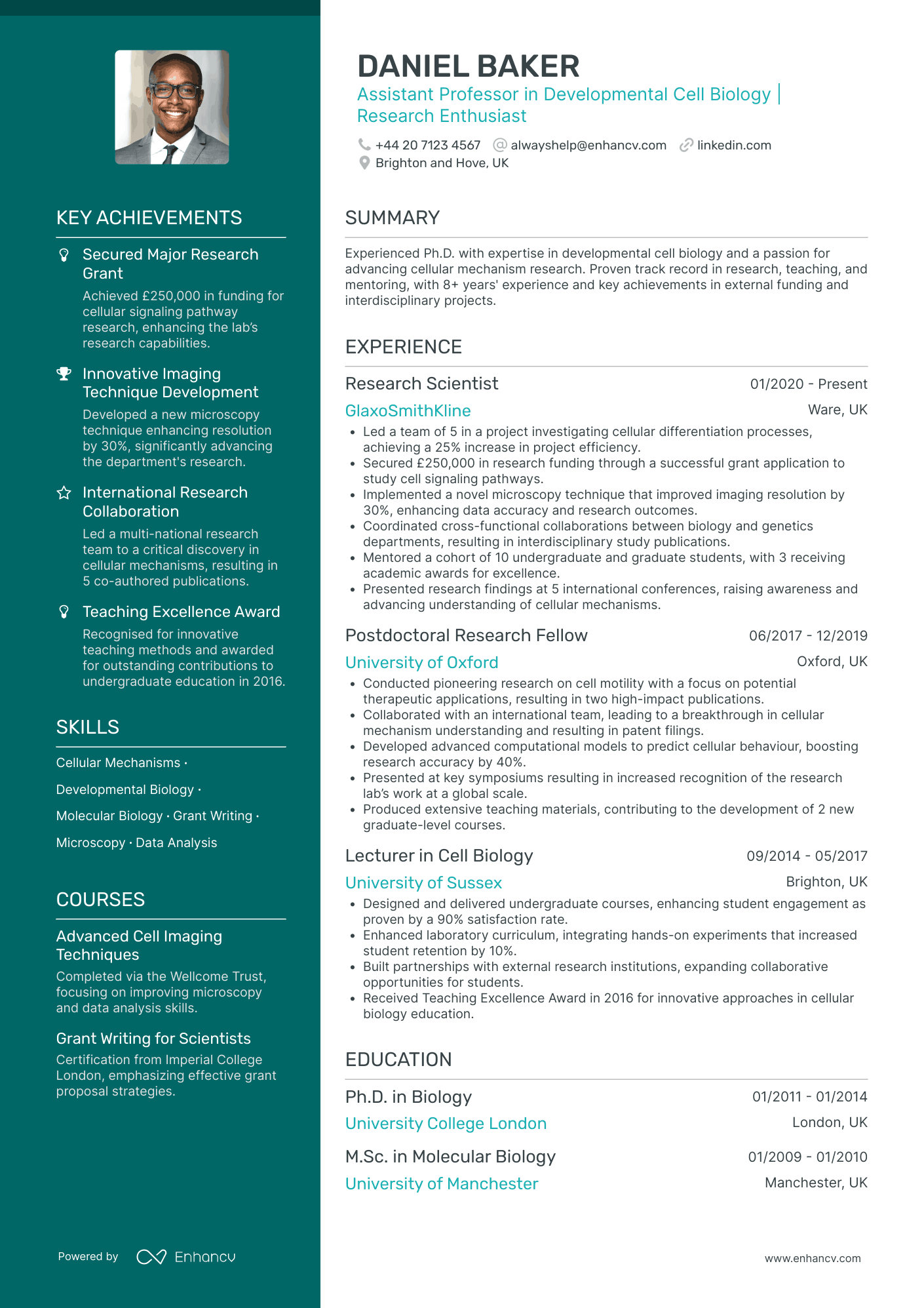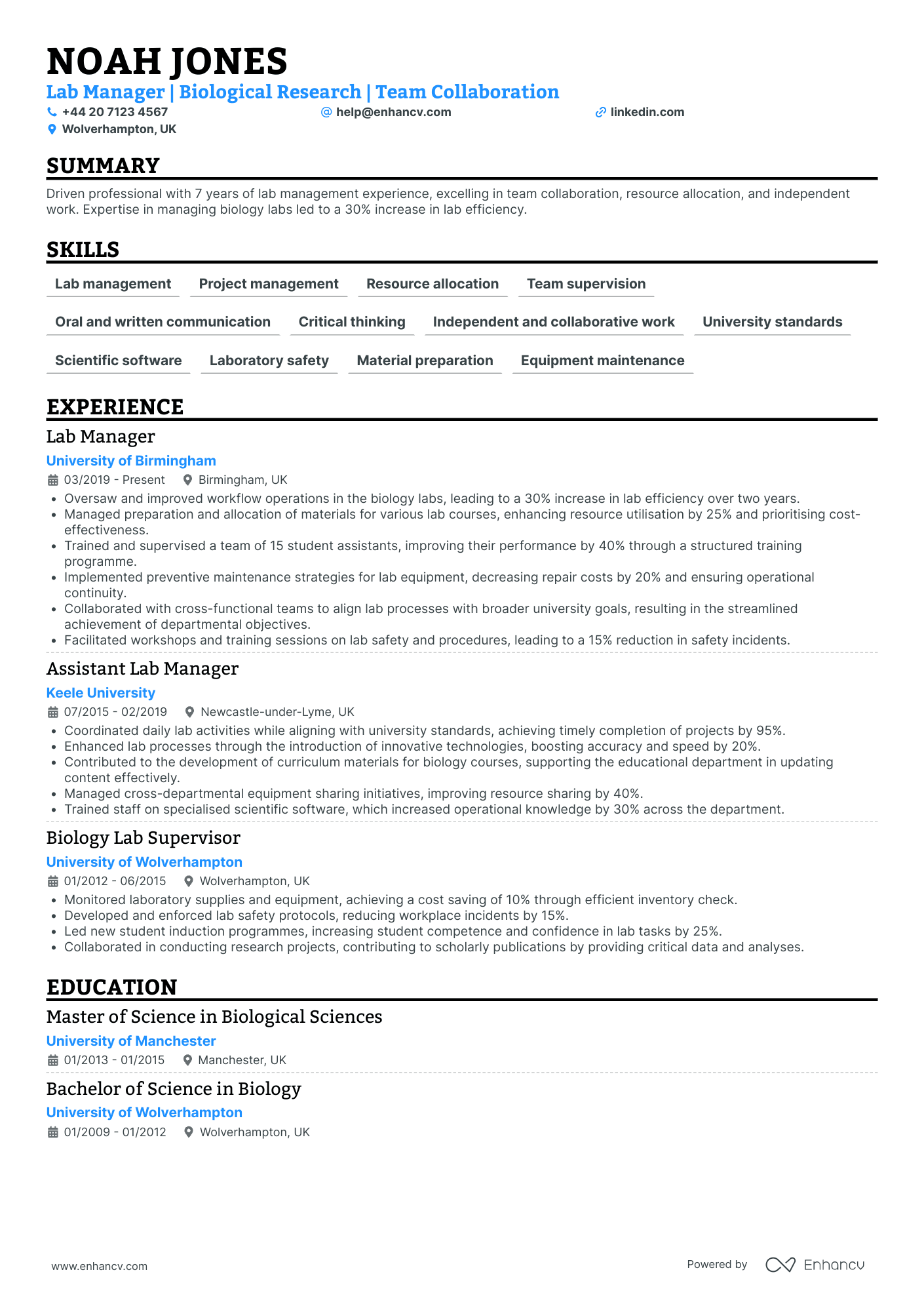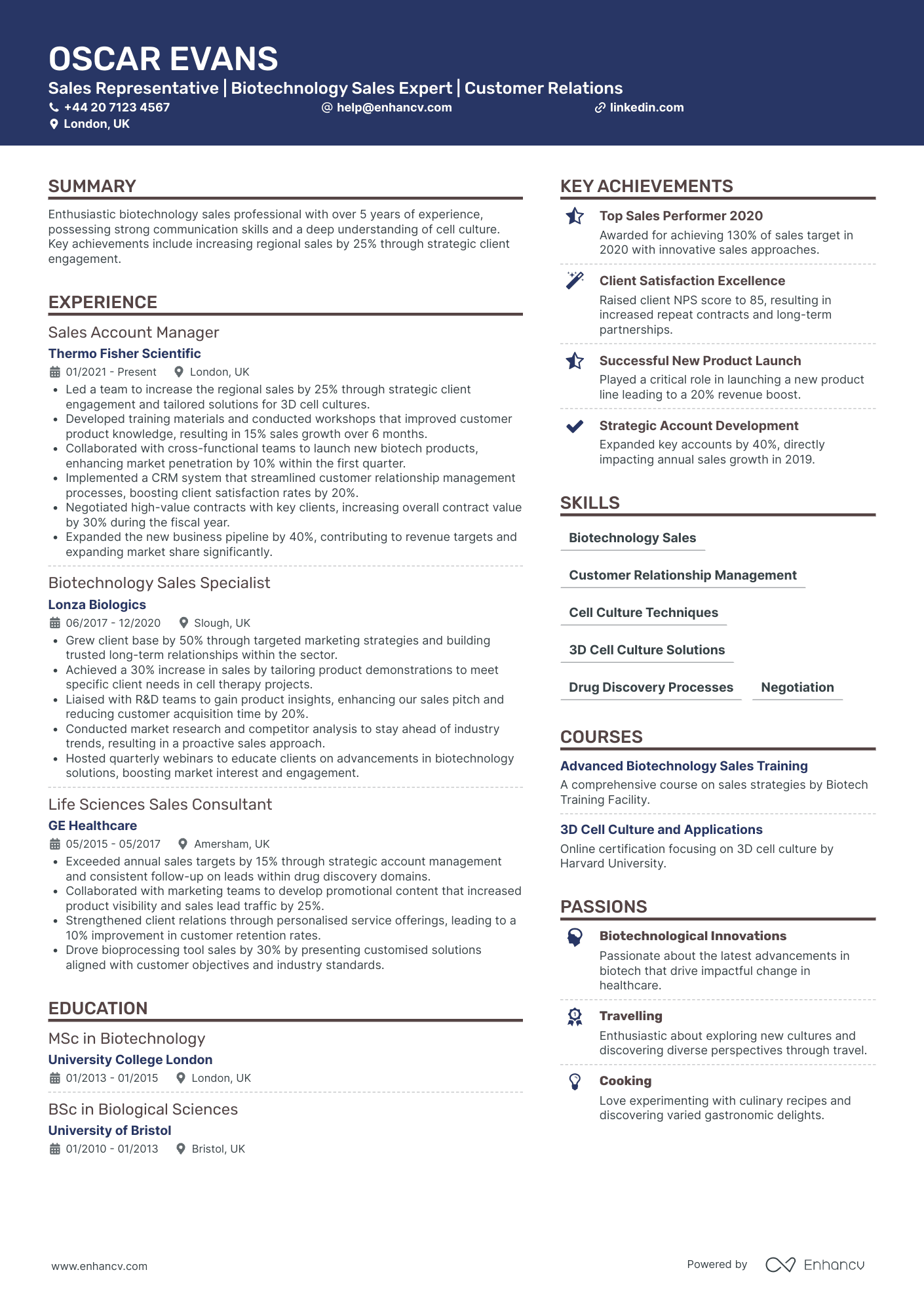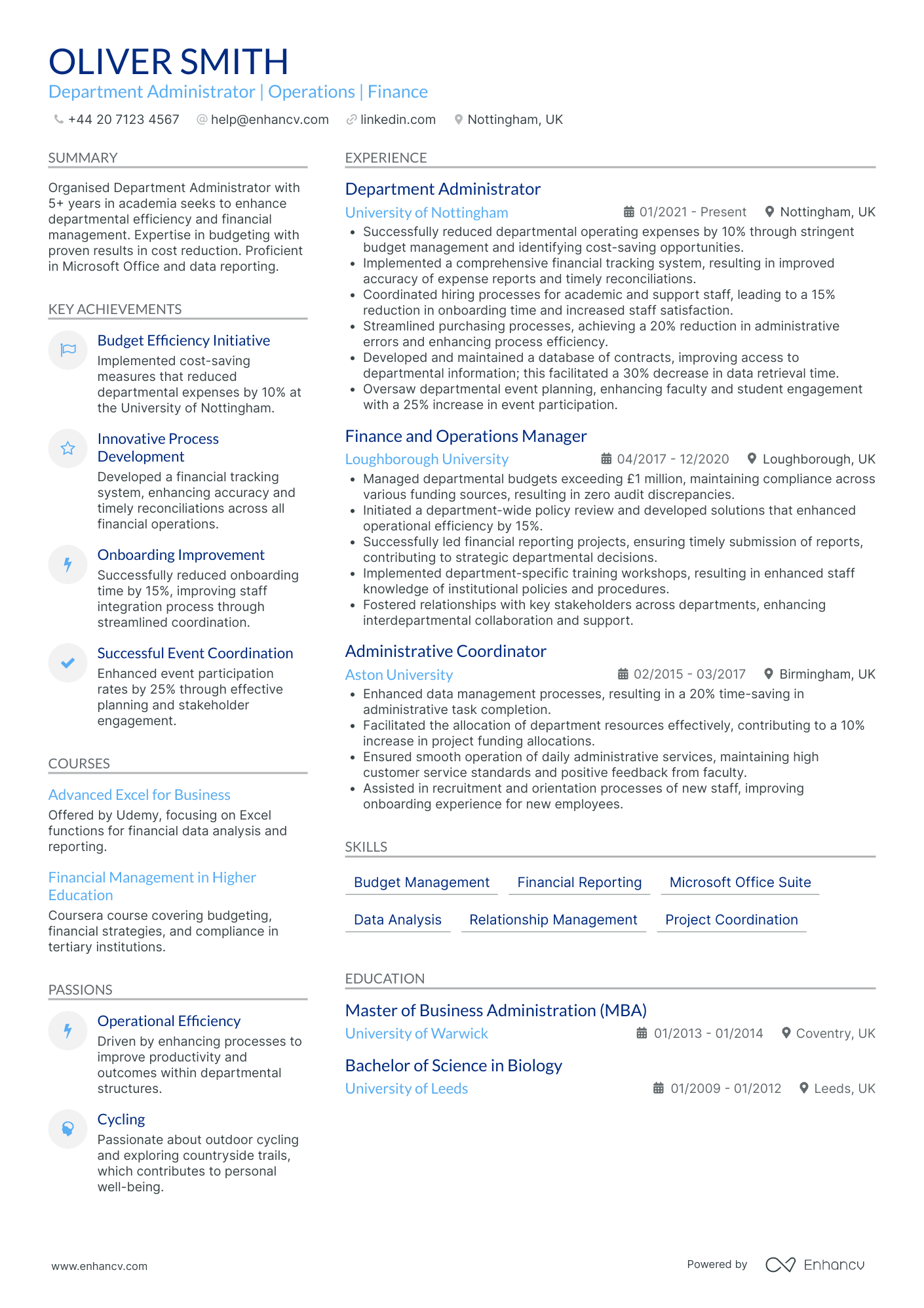Identifying and analysing morphological features in complex biological images is a significant computer vision (CV) challenge that requires precise algorithmic fine-tuning. Our guide offers comprehensive strategies and best practices to enhance your CV model's accuracy, ensuring reliable interpretation of biological data.
- Applying best practices from real-world examples to ensure your profile always meets recruiters' expectations;
- What to include in your work experience section, apart from your past roles and responsibilities?
- Why are both hard and soft skills important for your application?
- How do you need to format your CV to pass the Applicant Tracker Software (ATS) assessment?
If you're writing your CV for a niche biology role, make sure to get some inspiration from professionals:
Resume examples for biology
By Experience
Biology Research Assistant
- Clarity and Structured Presentation - The CV is meticulously organized, allowing for quick and easy navigation through the various sections. The layout is clean, with clear headings for each section, including experience, education, skills, and achievements, ensuring that key information is easily accessible to the reader.
- Career Trajectory and Industry Shifts - Finley Robinson's career path demonstrates a steady progression from a Research Assistant at AstraZeneca to a Fungal Research Scientist at Genelux Corporation. This trajectory showcases growth in responsibilities and expertise, highlighting shifts from broader microbiology to a specialized focus on fungal molecular biology.
- Industry-Specific Methodologies and Technical Depth - The CV highlights Robinson’s expertise in specialized, industry-specific techniques such as transcriptomics, proteomics, and large data set analysis. The inclusion of cutting-edge methodological skills in fungal detection and innate immune evasion reflects a deep technical understanding tailored to the needs of the field.
Biology Tutor
- Clear and Structured Presentation - The CV format is well-organized, making it easy to read and comprehend. Each section is clearly defined with concise bullet points that detail the candidate's experiences, skills, and achievements, ensuring that key information stands out to potential employers quickly and efficiently.
- Strong Career Progression in Education Sector - Florence’s career trajectory emphasizes steady growth within the educational sector, progressing from a Teaching Assistant role to an A-Level Biology Tutor and SEN Specialist. This trajectory not only highlights her dedication to the field but also showcases her expanding expertise in biology education and support for special educational needs.
- Innovative SEN Methodologies - The CV showcases Florence’s application of unique, industry-specific methodologies such as tailored learning plans for SEN students and feedback-driven lesson adjustments. These tools and approaches demonstrate her commitment to providing personalized educational support, which is crucial for fostering an inclusive classroom environment that improves student participation and results.
By Role
Biology Teacher
- Structured Clarity in Presentation - Alice Barnes' CV is well-organized, with clearly defined sections that enhance readability. The logical flow from summary to experience, education, skills, and personal interests ensures that key qualifications and accomplishments are highlighted effectively. The bullet-point format under each experience allows for quick absorption of the main achievements and responsibilities.
- Consistent Career Growth and Specialization - Alice's career trajectory demonstrates steady growth with an increased focus on student achievement and engagement in biology education. Starting as a Biology Instructor, she progressed to roles with more responsibility, reflecting her expertise and commitment to excellence in the field of science education.
- Impactful Achievements with Real-World Relevance - The CV highlights significant accomplishments, such as a 20% increase in exam pass rates and success in national biology competitions. These are not mere numbers—they reflect Alice's ability to significantly impact educational outcomes, illustrating her effectiveness as an educator and leader in science education.
Biology Lab Technician
- Strong Emphasis on Lab Safety and Compliance - The CV effectively highlights the candidate’s focus on environmental health and safety protocols, underscoring their commitment to maintaining a safe and compliant laboratory environment. The inclusion of quantifiable improvements, such as a 25% increase in lab safety compliance, illustrates their ability to significantly impact institutional safety standards.
- Demonstrated Leadership and Team Management - George Johnson showcases his leadership capabilities by managing a team of student employees, enhancing lab productivity by 15%. This experience, coupled with his role in training faculty on new protocols, reflects his strong interpersonal skills and capacity to lead and mentor others within a laboratory setting.
- Diverse Educational and Professional Background - Johnson’s educational journey from a Bachelor’s degree to a Master’s degree, as well as his consistent professional growth across renowned institutions, indicates a solid foundation in biological sciences and a steady career trajectory within academia. His ability to contribute to research and lab operations displays a well-rounded expertise applicable to various scientific and academic endeavors.
Marine Biology Consultant
- Structured Clarity and Conciseness - The CV is organized in a clear, logical manner that prioritizes essential information. Each section is well-defined, making it easy for employers to quickly understand Sophia's skills, accomplishments, and career progression. The conciseness of bullet points helps maintain focus on key achievements and responsibilities, ensuring no detail is lost amidst the content.
- Progressive Career Trajectory - Sophia's career path reflects steady growth and increasing responsibility, moving from an Environmental Scientist at Fugro GB Marine Ltd to a Senior Marine Environmental Consultant at Gardline Group. This natural progression showcases not only her personal development within the marine environmental consulting industry but also her commitment and the recognition she's received through promotions and more complex project management roles.
- Industry-Specific Expertise and Innovation - The CV highlights Sophia’s expertise in marine mammal mitigation, advanced acoustic monitoring tools, and introduces cutting-edge low-power marine monitoring technologies. Her technical depth is evident in her ability to improve data collection efficiencies, manage multimillion-dollar projects, and contribute significantly to environmental assessments and compliance, setting her apart in the niche of offshore marine consultancy.
Molecular Biology Scientist
- Structured Career Progression - Florence Knight's CV displays a clear career trajectory, showcasing her growth from a Molecular Biologist to a Research Scientist at prestigious pharmaceutical companies. Her career advances are marked by increasing responsibilities and leadership roles in complex research projects.
- Industry-Specific Methodologies - The CV stands out with its emphasis on advanced biochemical and microbiological methodologies, such as recombinant DNA techniques and fluorescence imaging. These demonstrate her technical depth and proficiency in cutting-edge scientific procedures, which are vital for the role.
- Significant Achievements with Impact - Florence effectively highlights her accomplishments with tangible business impact, such as improving lab efficiency by 30% and boosting yield by 25%. These achievements not only showcase her expertise but also underline her contributions to driving research and development forward at major biotech companies.
Biology Department Head
- Structured and comprehensive presentation - The CV is organized meticulously, with clear sections such as experience, education, skills, and achievements, making it easy for potential employers to quickly gauge Amelia Murphy's expertise. Each section is concise yet provides enough detail to convey her qualifications effectively, such as specific initiatives and outcomes she has led.
- Clear career growth and leadership - Amelia’s career trajectory showcases a progression from a Science Teacher to a Senior Science Teacher, and then a Biology Teacher, highlighting her increased responsibilities and leadership roles. Particularly, her role at Newcastle High School for Girls illustrates her capacity to lead teams and mentor new teachers, fostering both student and faculty development.
- Innovative educational methodologies - The CV underlines Amelia's focus on inclusive education and curriculum development. Her involvement in creating interdisciplinary STEM curricula and improving assessment methods not only demonstrates her technical prowess in education but also her dedication to engaging students in innovative ways, as seen with the substantial increase in student participation and engagement.
Environmental Biology Specialist
- Well-Structured Presentation - Joshua's CV is meticulously structured, allowing for clear insights into his educational background, career progression, and areas of expertise. The sections are logically organized, with concise bullet points effectively conveying key responsibilities and achievements.
- Strong Career Growth - The CV illustrates a clear trajectory of advancement from a general science teacher with a focus on Biology to the Head of Biology. This progression underscores his dedication to education and increasing leadership experience in his field.
- Effective Use of Technology in Education - Joshua has incorporated advanced teaching technologies like virtual labs into his curriculum, which are unique tools in the education sector. This not only highlights his adaptability to new technologies but also showcases his commitment to enhancing student engagement through innovative methods.
Biology Field Researcher
- Clear and Detailed Experience Section - The CV presents the candidate’s experience chronologically and provides detailed bullet points that clearly outline specific responsibilities and achievements for each role. This structured approach aids in understanding the candidate's contributions, showcasing their expertise and progressive achievements in bioinformatics.
- Demonstrates Progressive Career Growth - Elsie's career trajectory from a Genomics Data Scientist to a Senior Bioinformatician highlights a clear path of professional growth and increasing responsibility. This progression reflects Elsie's ability to leverage her skills and expertise to secure positions with greater impact within leading research institutions.
- Industry-Specific Technical Proficiency - The CV highlights Elsie's deep understanding and application of high-level bioinformatics tools and methodologies, such as single-cell RNA sequencing and data mapping. Her technical contributions underscore her ability to innovate within the genomics field, directly affecting data accuracy and research outcomes.
Wildlife Biology Manager
- Strong Leadership and Client Relationship Expertise - The CV stands out by showcasing the candidate's proven leadership skills and client relations expertise. Eva Fisher's experience in managing cross-functional teams and expanding client programs demonstrates her ability to lead teams effectively while maintaining and growing client relationships, crucial for a Lead Wildlife Biologist and Program Manager.
- Comprehensive Cross-Functional Background - Eva's CV effectively highlights her adaptability and cross-disciplinary experience. She has worked in diverse roles ranging from field research to program management, showcasing her ability to integrate environmental considerations into major infrastructure projects. This demonstrates her flexibility and capacity to handle complex projects with diverse stakeholders.
- Significant Achievements with Business Impact - The CV underscores measurable business relevance by detailing accomplishments such as improving project profit margins, decreasing compliance issues, and accelerating regulatory approvals. These achievements demonstrate her capability to not only meet environmental goals but also contribute positively to the organization's bottom line and operational efficiency.
Biology Data Analyst
- Effective Content Presentation - Elsie Murray's CV is neatly structured with clear headings and bullet points that enhance readability. The concise language used in each section allows for quick comprehension of key skills and accomplishments, ensuring that crucial information is easily accessible to potential employers.
- Well-Defined Career Trajectory - Elsie's career path showcases significant growth, advancing from a Data Analyst position to a postdoctoral researcher. Each role highlights increasing responsibilities, collaboration in interdisciplinary teams, and leadership in mentorship programs, reflecting a continuous upward trajectory in the competitive fields of data science and applied topology.
- Emphasis on Industry-Related Achievements - The CV emphasizes Elsie's substantial contributions to the industry, such as her development of new data analysis techniques that yielded a 30% efficiency improvement. These achievements not only underscore her technical capabilities but also demonstrate significant business impact, enhancing research operations and contributing to academic advancements.
Cell Biology Technician
- Clear and Detailed Content Presentation - The CV exhibits a well-structured format, presenting information concisely and clearly. Key sections such as experience, education, and achievements are segmented distinctly, ensuring that each area of expertise and contribution is highlighted effectively, making it easy for the reader to navigate.
- Strong Career Trajectory and Growth - Jacob's career shows a clear progression within the field of molecular biology, moving from a lab technician position at GlaxoSmithKline to a research technician role at Oxford Biomedica. This upward trajectory demonstrates not only the acquisition of more complex responsibilities but also recognition within his industry for his expertise and contributions.
- Utilization of Industry-Specific Methodologies - The CV underscores Jacob’s proficiency with specialized techniques such as gene transfer, DNA/RNA preparation, and protein analysis, along with the use of advanced tools like gel electrophoresis. Such specific references accentuate his technical depth and highlight his ability to utilize industry-relevant methodologies effectively in his research endeavors.
Biology Curriculum Developer
- Structured Presentation of Experience - The CV is well-organized, with clear sections that delineate the candidate's comprehensive work experience. Each position is accompanied by concise bullet points that highlight key achievements and responsibilities, making it easy for potential employers to quickly assess the candidate’s qualifications.
- Strategic Career Progression - Arthur's career trajectory shows a deliberate move from teaching to designing educational curriculums. This shift not only indicates a growth in his professional path but also underscores his transition from implementing to creating educational content, showcasing ambitions to influence the educational landscape on a broader scale.
- Emphasis on Interactive Learning Enhancements - The CV highlights Arthur's proficiency in integrating modern educational tools, such as interactive simulations and digital content platforms, to enhance student engagement and comprehension. This technical depth is crucial for roles focused on curriculum development in today’s technology-enhanced educational environments.
Biology Quality Assurance Specialist
- Structured and Concise Presentation - The CV is well-organized into clear sections, providing concise information that is easy to follow. Notably, the use of bullet points under each role effectively summarizes key responsibilities and achievements, making the document reader-friendly.
- Clear Career Progression - Harper Webb's career trajectory is clearly outlined, demonstrating a logical progression from Manufacturing Process Technician to Quality Specialist. This path shows intentional career growth and increasing levels of responsibility within the pharmaceutical industry.
- Industry-Specific Expertise - The CV showcases specialized knowledge in cGMP compliance and quality oversight, combined with technical skills in SOP authoring and risk mitigation. These elements reflect the candidate’s depth of expertise, essential for a Quality Specialist role in the manufacturing sector.
Biology Project Coordinator
- Structured presentation enhances readability - The CV is organized into clear, distinct sections such as experience, education, skills, and passions. This logical layout ensures that the reader can quickly identify the relevant parts, which is crucial for capturing attention in the competitive field of academic advising.
- Consistent career growth within education - Edward Mitchell's career trajectory shows a strong upward momentum within the educational sector, evidenced by promotions from a Biology Curriculum Developer to a Senior Academic Advisor. This progression underlines his capability for growth and increased responsibility over time.
- Effective communication and multicultural collaboration - Soft skills are highlighted through Edward's proficiency in both Mandarin and English, as well as his competence in working within multicultural teams. This adaptability is particularly significant in international educational environments, where cross-cultural communication is key to success.
Biology Content Writer
- Articulates Career Development and Industry Focus - James Lewis demonstrates a clear career trajectory from a research assistant to a prominent junior grant writer, indicating growth and advancement within the life sciences and biotechnology sectors. His roles show a strong connection to his academic background, reflecting a well-defined career path aligned with industry-specific skills.
- Technical Expertise with Advanced Tools - The CV effectively highlights James's proficiency with advanced grant management software, emphasizing his technical depth in streamlining grant application processes. His use of specific tools not only enhances operational efficiency but directly impacts the success rates of funding applications, underscoring his innovative approach to grant writing.
- Achievements with Strategic Business Impact - Each listed achievement carries considerable business relevance, such as securing high-value grants and increasing funding success rates significantly. These accomplishments not only enhance James's credibility as a grant writer but also demonstrate his strategic acumen in harnessing resources and optimizing proposal techniques for higher acceptance rates.
Developmental Biology Professor
- Structured presentation of information enhances readability - The CV presents information clearly and concisely, with well-organized sections like experience, education, and achievements. The use of bullet points helps in quickly conveying significant accomplishments and responsibilities, making it easy for readers to grasp the candidate's expertise.
- Clear progression and consistent growth in academia and research - Daniel Baker's career trajectory shows a steady climb from a Lecturer position at the University of Sussex to an Assistant Professor, alongside a research scientist role at GlaxoSmithKline. This progression signifies a strong professional development and increasing responsibilities, showcasing both academic and industry expertise.
- Impressive leadership and mentoring skills - The CV effectively demonstrates Daniel's leadership qualities, highlighting his ability to lead research teams, mentor students, and coordinate collaborations. His mentoring achievements, where students received academic awards, underscore his dedication to fostering growth in others, a critical skill in academia and research environments.
Biology Lab Manager
- Structured Presentation of Career Growth - The CV effectively outlines the progression from a Biology Lab Supervisor to a Lab Manager, showcasing a clear trajectory of increasing responsibility and expertise in biological research and lab management.
- Emphasis on Soft Skills and Leadership - Noah's CV highlights critical soft skills such as team collaboration, supervision, and cross-departmental teamwork. Leadership is evident through the training of student assistants and staff, as well as spearheading workshops to improve lab safety.
- Significant Achievements and Impact - The CV is rich with quantifiable successes like increasing lab efficiency by 30% and reducing safety incidents by 15%. These achievements illustrate Noah's capacity to significantly impact business operations and improve lab functionality, underpinning his value to potential employers.
Biology Sales Representative
- Strategically Structured Content for Clarity - The CV is structured with a logical flow of sections, including a detailed summary, clearly segmented work experience, and highlighted achievements. This coherent organization allows for easy navigation and efficient comprehension of Oscar Evans' professional narrative, showcasing his expertise and accomplishments concisely.
- Consistent Career Growth and Industry Focus - Oscar's career trajectory reflects a steady progression through roles focused on biotechnology sales. Each position, from Sales Consultant to Sales Account Manager, builds upon previous experiences, illustrating a commitment to the biotechnology field and demonstrating an upward trend in responsibility and influence within the industry.
- Emphasis on Strategic Achievements with Business Impact - The CV highlights Oscar's ability to deliver significant business results through achievements such as increasing regional sales by 25% and expanding the new business pipeline by 40%. These accomplishments not only demonstrate his sales prowess but also underline his strategic impact on market expansion and revenue growth for his employers.
Biology Department Administrator
- Clarity and Strategic Structure - The CV is laid out in a clear and structured format, allowing easy navigation through the candidate's career story. Key sections such as experience, education, skills, and achievements are methodically placed, ensuring the narrative follows a logical progression from academics to current roles. The detailed bullet points under each role provide concise snapshots of responsibilities and accomplishments, making the document both informative and accessible.
- Growth in Academic Administration and Finance - Oliver Smith's career trajectory is marked by consistent growth within academic administration and finance roles, illustrating a deepening of expertise in these areas. Starting as an Administrative Coordinator and advancing to a Department Administrator, each position reflects increased responsibility and expanded skill sets. These roles demonstrate a natural progression toward strategic leadership in university operations and financial management.
- Effective Budget Management and Operational Strategy - Highlighting key initiatives shows Oliver’s proficiency in managing large budgets, as evidenced by the implementation of cost-saving measures that significantly reduced operating expenses. The CV places special emphasis on innovative financial solutions and policy development, demonstrating Oliver's role in enhancing operational efficiency and achieving institutional strategic objectives. These achievements reflect both technical understanding and the ability to enact impactful solutions.
Structuring and formatting your biology CV for an excellent first impression
The experts' best advice regarding your CV format is to keep it simple and concise. Recruiters assessing your CV are foremost looking out for candidates who match their ideal job profile. Your white space, borders, and margins. You may still be wondering which format you need to export your CV in. We recommend using the PDF one, as, upon being uploaded, it never alters your information or CV design. Before we move on to the actual content of your biology CV, we'd like to remind you about the Applicant Tracker System (or the ATS). The ATS is a software that is sometimes used to initially assess your profile. Here's what you need to keep in mind about the ATS:
- All serif and sans-serif fonts (e.g. Rubik, Volkhov, Exo 2 etc.) are ATS-friendly;
- Many candidates invest in Arial and Times New Roman, so avoid these fonts if you want your application to stand out;
- Both single and double column CVs can be read by the ATS, so it's entirely up to you to select your CV design.
PRO TIP
Be mindful of white space; too much can make the CV look sparse, too little can make it look cluttered. Strive for a balance that makes the document easy on the eyes.
The top sections on a biology CV
- Educational Background details your expertise, vital for biology roles.
- Research Experience shows your hands-on work in the field.
- Publications and Presentations demonstrate your contribution to science.
- Lab Techniques and Skills highlight your practical laboratory abilities.
- Grants and Fellowships indicate recognition and funding success.
What recruiters value on your CV:
- Highlight your publications and research experience, specifying your role in each project and the outcomes, as showcasing a track record of scientific investigation is crucial in biology.
- Detail any specialist techniques or laboratory skills relevant to the field of biology you're targeting, as employers seek candidates with hands-on experience in specific methodologies.
- Include any experience with scientific software or bioinformatics tools, since the ability to analyse biological data is highly valued in modern biological sciences.
- Emphasise collaborative projects and any interdisciplinary work that showcases your ability to work in diverse teams and integrate different fields of study.
- Mention any teaching or supervisory experience, as many biology roles, especially in academia, require mentoring or educating others in the field.
Recommended reads:
Making a good first impression with your biology CV header
Your typical CV header consists of Your typical CV header consists of contact details and a headline. Make sure to list your professional phone number, email address, and a link to your professional portfolio (or, alternatively, your LinkedIn profile). When writing your CV headline , ensure it's:
- tailored to the job you're applying for;
- highlights your unique value as a professional;
- concise, yet matches relevant job ad keywords.
You can, for examples, list your current job title or a particular skill as part of your headline. Now, if you decide on including your photo in your CV header, ensure it's a professional one, rather than one from your graduation or night out. You may happen to have plenty more questions on how to make best the use of your CV headline. We'll help you with some real-world examples, below.
Examples of good CV headlines for biology:
Senior Research Scientist | Immunology Expert | PhD in Molecular Biology | 10+ Years of Experience
Conservation Biologist Coordinator | Wildlife Preservation | MSc Env. Science | Chartered Biologist | 6 Years' Fieldwork
Junior Lab Technician | Cellular Biology Focus | BSc Graduate | Laboratory Safety Certified | 2 Years Laboratory Assistance
Marine Biology Lecturer | PhD Marine Ecology | Coral Reef Conservationist | 8 Years Academic Teaching
Clinical Research Associate | Oncology Specialisation | Clinical Trial Management | GCP Certified | 5 Years Experience
Senior Bioinformatics Analyst | Genomic Data Analysis | MSc Bioinformatics | Python & R Skilled | 7+ Years in Research
Choosing your opening statement: a biology CV summary or objective
At the top one third of your CV, you have the chance to make a more personable impression on recruiters by selecting between:
- Summary - or those three to five sentences that you use to show your greatest achievements. Use the CV summary if you happen to have plenty of relevant experience and wish to highlight your greatest successes;
- Objective - provides you with up to five sentences to state your professional aims and mission in the company you're applying for
CV summaries for a biology job:
- Seasoned molecular biologist with 12 years of rigorous experience in genetic sequencing techniques and a track record of pioneering a groundbreaking study on gene therapy for cystic fibrosis. Expert in CRISPR-Cas9 technology with a robust publication record in high-impact journals.
- Dynamic marine biologist with over a decade of expertise in coral reef ecosystems, distinguished by acclaim for revealing the impact of climate change on marine biodiversity. Renowned for leadership in cross-continental research collaborations, and adept at multidisciplinary approaches to conservation policy advocacy.
- Highly skilled computer scientist making a strategic transition into computational biology, bringing a robust skill set in algorithm development and big data analytics. Previously transformed a fintech startup's data infrastructure, enabling a 40% increase in transaction processing efficiency.
- Experienced chemical engineer ready to leverage extensive background in pharmaceuticals and a strong aptitude for analytical chemistry to innovatively contribute to groundbreaking research in biochemistry and molecular biology, aiming to advance the understanding of therapeutic drug interactions.
- Aspiring biologist with a fervent zeal for environmental conservation, seeking to apply a freshly acquired Master's degree in Biology. Eager to contribute to pioneering research in ecological restoration, aiming to meld theoretical knowledge with hands-on laboratory and field experience.
- Keen graduate with a B.Sc. in Physics enthusiastic about transitioning into wildlife biology, dedicated to mastering new field research techniques and applying quantitative problem-solving skills to tracking and analyzing ecosystem dynamics, pursuing a fulfilling career in biodiversity protection.
The best formula for your biology CV experience section
The CV experience section is the space where many candidates go wrong by merely listing their work history and duties. Don't do that. Instead, use the job description to better understand what matters most for the role and integrate these keywords across your CV. Thus, you should focus on:
- showcasing your accomplishments to hint that you're results-oriented;
- highlighting your skill set by integrating job keywords, technologies, and transferrable skills in your experience bullets;
- listing your roles in reverse chronological order, starting with the latest and most senior, to hint at how you have grown your career;
- featuring metrics, in the form of percentage, numbers, etc. to make your success more tangible.
When writing each experience bullet, start with a strong, actionable verb, then follow it up with a skill, accomplishment, or metric. Use these professional examples to perfect your CV experience section:
Best practices for your CV's work experience section
- Clearly outline your experience with specific laboratory techniques, such as PCR, Western blotting, or microscopy, which are relevant to the biology role you are applying for.
- Include any research projects you have been involved in, specifying your role, the objective of the project, and any significant outcomes or findings.
- Mention publications or presentations you have contributed to, providing details of the title, co-authors, and the name and date of the journal or conference.
- Detail your experience with statistical analysis and data interpretation, highlighting any proficiency with software such as R, Python, or specialized biological software.
- Exhibit your understanding of compliance with safety protocols and ethical standards in research, including any relevant certifications you may hold.
- Emphasize any collaborative work and your ability to function as part of a team, giving examples of multi-disciplinary projects or joint publications.
- Highlight any experience in obtaining funding or grants, demonstrating your ability to successfully propose and manage research budgets.
- Include any teaching or mentoring experience, signifying your ability to communicate complex biological concepts to varied audiences.
- Feature any unique experiences such as fieldwork, indicating locations, the focus of the study, and any particular techniques or tools you used.
- Led a team of 5 in the molecular genomics project that resulted in the identification of 15 novel gene markers for hereditary conditions.
- Implemented a new cell culturing technique which increased laboratory efficiency by 25% and reduced cross-contamination instances by 40%.
- Authored and co-authored 3 research papers published in peer-reviewed journals, enhancing the company's academic presence and credibility.
- Developed a novel drug testing protocol using bioassay systems, cutting down the average drug development lifecycle by 6 months.
- Collaborated with cross-functional teams across 3 countries which led to the successful launch of an antiviral vaccine program.
- Managed the laboratory budget effectively, saving the department £50,000 annually through cost-effective resource allocation.
- Conducted pioneering research on plant-derived compounds, isolating 10 new potential pharmaceuticals active against bacterial infections.
- Supervised a workforce of 7 technicians, elevating the quality of experimental data by implementing rigorous peer-review practices.
- Spearheaded a biodiversity conservation project that mapped over 1000 square miles of rainforest, identifying 200 unique species.
- Directed lab research focused on aquaculture, leading to a 30% increase in the sustainability of fish farming practices.
- Played a key role in the development of an award-winning marine pollution assessment methodology.
- Enhanced public engagement through the creation of an interactive marine biology exhibit visited by over 50,000 school children.
- Pioneered a genetic engineering project that developed a drought-resistant crop strain, potentially benefiting millions in arid regions.
- Oversaw the department's transition to automated genetic sequencing, improving throughput by 35% without compromising accuracy.
- Contributed to securing a £5 million grant for cutting-edge research into transgenic organisms, leading to three successful patents.
- Key player in a team that discovered a new metabolic pathway in microorganisms, providing insights into alternative energy sources.
- Designed a new experimental protocol for studying enzyme kinetics, reducing the time-to-results for critical experiments by 20%.
- Established a collaboration with an international consortium, sharing best practices and enhancing the company's global outreach.
- Initiated and led a conservation project that rehabilitated 150 hectares of wetland, significantly improving the local ecosystem's biodiversity.
- Developed community outreach programs on environmental sustainability that engaged over 10,000 local residents in conservation efforts.
- Successfully advocated for policy changes with local government, resulting in the institution of a protected area status for a critical habitat.
- Headed a clinical trial for a new anti-inflammatory drug, overseeing patient recruitment and data analysis, leading to phase III trial advancement.
- Introduced a laboratory information management system that streamlined sample processing and reduced error rates by 15%.
- Collaborated with international research teams to publish a comprehensive study on autoimmune diseases in a top-tier scientific journal.
Swapping your professional experience (when you have none) with skills and more
Never underestimate the importance of relevancе when it comes to your biology CV. Even if you don't happen to have much or any standard (full-time contract) professional experience, this doesn't mean you shouldn't apply for the role. Instead of a bespoke CV experience section:
- Showcase more prominently any internships, part-time roles, and volunteer experience that are applicable to the role and have taught you job-crucial skills;
- Feature a strengths or achievements section with your transferrable skills or talents you've obtained thanks to your work or life experience;
- Write an objective statement that clearly outlines your values as a candidate and defines your career ambitions;
- List your education or certificates that match the job profile closer to the top of your CV.
Recommended reads:
PRO TIP
Describe how each job helped you grow or learn something new, showing a continuous development path in your career.
Key biology CV skills: what are hard skills and soft skills
Let's kick off with the basics. You know that you have to include key job requirements or skills across your CV. For starters, take individual skills from the job description and copy-paste them into your CV, when relevant. Doing so, you'll ensure you have the correct skill spelling and also pass the Applicant Tracker System (ATS) assessment. There are two types of skills you'll need to include on your CV:
- Hard skills - technical abilities that are best defined by your certificates, education, and experience. You could also use the dedicated skills section to list between ten and twelve technologies you're apt at using that match the job requirements.
- Soft skills - your personal traits and interpersonal communication skills that are a bit harder to quantify. Use various CV sections, e.g. summary, strengths, experience, to shine a spotlight on your workspace achievements, thanks to using particular soft skills.
Remember that your job-winning CV should balance both your hard and soft skills to prove your technical background, while spotlighting your personality.
Top skills for your biology CV:
Laboratory Techniques
Microscopy
Bioinformatics
Statistical Analysis
Molecular Biology
Genetic Engineering
Environmental Sampling
PCR & Electrophoresis
Biodiversity Assessment
Scientific Writing
Critical Thinking
Problem Solving
Time Management
Teamwork
Communication
Attention to Detail
Adaptability
Project Management
Ethical Judgement
Continuous Learning
PRO TIP
If you have received professional endorsements or recommendations for certain skills, especially on platforms like LinkedIn, mention these to add credibility.
Listing your university education and certificates on your biology CV
The best proof of your technical capabilities would be your education and certifications sections. Your education should list all of your relevant university degrees, followed up by their start and completion dates. Make sure to also include the name of the university/-ies you graduated from. If you happen to have less professional experience (or you deem it would be impressive and relevant to your application), spotlight in the education section:
- that you were awarded a "First" degree;
- industry-specific coursework and projects;
- extracurricular clubs, societies, and activities.
When selecting your certificates, first ask yourself how applicable they'd be to the role. Ater your initial assessment, write the certificate and institution name. Don't miss out on including the completion date. In the below panel, we've curated relevant examples of industry-leading certificates.
PRO TIP
If you have received professional endorsements or recommendations for certain skills, especially on platforms like LinkedIn, mention these to add credibility.
Recommended reads:
Key takeaways
What matters most in your biology CV-writing process is for you to create a personalised application. One that matches the role and also showcases your unique qualities and talents.
- Use the format to supplement the actual content, to stand out, and to ensure your CV experience is easy to comprehend and follows a logic;
- Invest time in building a succinct CV top one third. One that includes a header (with your contact details and headline), a summary or an objective statement (select the one that best fits your experience), and - potentially - a dedicated skills section or achievements (to fit both hard skills and soft skills requirements);
- Prioritise your most relevant (and senior) experience closer to the top of your CV. Always ensure you're following the "power verb, skill, and achievement" format for your bullets;
- Integrate both your technical and communication background across different sections of your CV to meet the job requirements;
- List your relevant education and certificates to fill in gaps in your CV history and prove to recrutiers you have relevant technical know-how.


